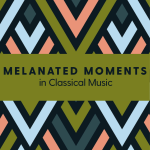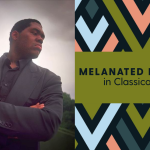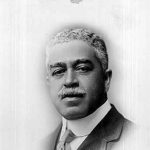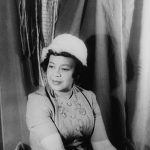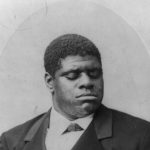Melanated Moments, Bonus Episode 3: Innovation and Resilience
In this third and final bonus episode, Joshua and Angela are joined again by the prolific and talented Dr. Bill Banfield. He shares insights from his time serving on the Pulitzer committee for music, and we listen to his arrangement titled The Cape Is Charming, whose lyrics were taken from a letter written by Langston Hughes.
Featured Music:
“The Cape is Charming,” by William Banfield
Music Plays (00:05): [MMCM Theme] Joshua Thompson (00:14): Hello everyone. I’m Joshua Thompson… Angela Brown (00:17): And I am Angela Brown. Joshua Thompson (00:18): And we’re here with our third and final bonus episode before the launch of our second full season, Later in 2021. Make sure you catch the first two bonus episodes. Just in case you haven’t, we’ve been talking about 2020, which has been one of the most historic and tumultuous times in modern American history. On the last episode, we focused on the pandemic. So for this episode, we’d like to talk about a few things that are very important– I’d say, now more than ever– innovation and resilience. So for that, we’d like to turn to our amazing and prolific special guests for these episodes, Dr. Bill Banfield. Angela, I understand you’ve got a few pieces picked out from Dr. Banfield’s repertoire, which reflect, not only innovative approaches, but the idea of taking tragedy or hardship and using it to fuel art. So Angela, tell us what are a few pieces you’ve got in mind. Angela Brown (01:16): Yes. There are a couple of pieces that I really enjoy listening to that I wanted to ask you some questions about. Bill Banfield (01:27): Oh sure, sure! Angela Brown (01:27): And one of them from The Harlem Symphony, and I believe the piece is called “The Cape is Charming”. Bill Banfield (01:35): Yeah. Yeah! Angela Brown (01:36): And can you tell us, is that actually a song cycle or part of a song cycle or is it actually from a symphony? Bill Banfield (01:43): No, that is actually Symphony Twelve, I think. Yeah, and it’s taken from a letter that Langston Hughes wrote to his buddy. They were going to Cuba. You know, I’ve been to Cuba over the last three or four or five years, six times actually. and– Angela Brown (02:02): Wow. Bill Banfield (02:04): –And so I thought it was really incredible when Langston Hughes went to Cuba and he wrote to Carl van Vechten, one of his supporters in New York who was living in Harlem, and one of the lines from it was: I hope Harlem is still there. So I called the symphony “I Hope Harlem is Still There”. I call it, for short, my Harlem Symphony. But that movement, “The Cape is Charming”, is from– what I did Angela and Josh– I just transcribed every word of Langston Hughes’s letter. There was– unedited. And– Angela Brown (02:35): Wow! Bill Banfield (02:35): And, and one of the lines is: you know, he’s talking about how charming the Cape looked at the particular part of– as the ships came into the bay, that he was staying in– how charming the rooms were. And he said how charming the whole thing was. And he talked about this in his letter, and that particular movement, uh, “It’s Charming” is from– all those words in that aria or that song is actually the words of Langston Hughes. So, I mean, it’s interesting to talk about that. Langston Hughes was a griot. He was a poet using his words and insights to illuminate the way for the people and to do social critique and social kind of, uh, dealing with inequities in our, in our lives. So here’s a great poet who we depend upon, and so that’s where the lines from this symphony come from– actually from a Langston Hughes letter. Angela Brown (03:28): Wow. That’s deep talk! Well, let’s listen to it a little bit, yes. Bill Banfield (03:33): Okay! Music Plays (03:36): [Bill Banfield, “The Cape is Charming,” performed by The Harlem Symphony] Angela Brown (07:59): So charming! Bill Banfield (08:02): So charming! You can imagine he’s– this is like– this is 1932. So he is a young 30 year old, right? I mean, come on! He’s traveling with his buddy. They want to go to Cuba, and he’s writing to his business partner in New York talking about, “It’s so charming”– you know– “Our rooms look over the bay, we only spendin’ $25/mo. Angela Brown (08:22): Only twenty-five dollas… Bill Banfield (08:22): Right? Yeah! We go to parties. We have plenty of friends. Our friends take us to cockfights, you know, fish boats, dances on the weekend. So he’s just hanging out, you know what I’m saying? It’s just talking about what he’s dealing with, so that’s what that’s about he says, and it’s so charming. Angela Brown (08:39): I love it. Now tell me, how do you select who you’re going to work with, like the voices. Who was that young soprano? Bill Banfield (08:45): That young soprano sang– and that was the Philip Brunelle Vocal Essence Ensemble, one of the greatest vocal groups in the country. And they have their own orchestra, and they commissioned this work for me. Um, and I was so moved by the Langston Hughes poem that I actually wrote the publisher, “So listen, I really want to set this”, and they gave me permission to set it. Generally, what happens is if you– you know, when you’re a composer, you may write your own libretto or libretti, your poems or whatever, but sometimes you run across pieces like that– in the case of someone like Langston Hughes. His words are very– and they’re very specific to you, so you have to get permission from the–Hey yeah, this was a very delicate negotiation, but no one had set a letter of Langston Hughes before. This wasn’t one of his poems. I mean, if you can imagine, that’s not a poem! That’s the way this brother speaks when he writes the letter. I mean, when you’re reading it– it’s so dynamic, like a story or a poem. So I said, “My goodness, I didn’t have to change one word!” Joshua Thompson (09:50): I love how you’ve done that. Cause again, it’s being innovative to use what’s already there– with respect, right. Um– Bill Banfield (09:58): Yeah, yep. Right. Joshua Thompson (09:58): –which, kind of tying into the summer, again, I would have to say retrospectively– probably not since what, 1968– have we seen a summer as racially charged. And we can all espouse and remember Langston Hughes’s, uh, “What Happens to a Dream Deferred”– Here comes these other 21st century reiterations of the same things. And you do that with music to be able to talk about– again, we’ve talked about it: humanity– humanity in Melanated Moments in Classical Music– humanity in the melanin of the bodies that we exist in. And we just felt– Angela and I just kind of felt like, “Well, you know, this would be a great platform in which to not convince and/or make a case, but to repackage and reframe and hold the mirror up to our listening audience”, to really, I don’t know, compel us through music to take stock of what’s happened over 2020 in this regard and really think about it. You know? Um, another thing that I really enjoyed– and this is kind of like our nice setup for this next little segue– Angela Brown (11:07): Okay! Joshua Thompson (11:11): Is– we’ve discussed issues with the pandemic. We have briefly touched on issues with racial equity or inequity, but like Angela said, at the beginning of these episodes: there’s some really positive things that we need to highlight. And so guess what: we go highlight ’em. In the midst of all of this, in the world of melanated peoples and in melanated music, there’s been some incredible new music that has been created out of this. And Dr. Bill, you alluded to it already. You were the president of the selection committee for the Pulitzer Prize in music. Can you tell us– because this is resiliency, this is creativity, perseverance, born out of this– Give us an understanding of what won. Cause you were the president of this. What won this year’s 2020 Pulitzer Prize in Music? Bill Banfield (12:03): I was The Chair. The Pulitzer is– has many categories: novels, literature, they’re all kinds of things. And music is one, every year. The Pulitzer board awards, a top chosen work to be the piece to be awarded the Pulitzer Prize in Music. I was the Chair of the Music Committee this year. And so, interestingly enough, this year was the largest amount– in 2020– of submissions in the whole history of the Pulitzer Prize. So that should tell you, right there, that people– despite the fact that we’re in the middle of COVID, or the beginning and people were moving in these last year or so– more people are engaged in quality music– all kinds of music; from poetry, to dance, to art, music, to rock & roll, to hip hop. People–artists– are creating, like you all said, responses to the world and the life that we live contemporarily, and the Pulitzer Prize is– it gives one of the finest examples of that. And this year, we chose Anthony Davis’s Central Park Five, which deals with inequity. It really does– that’s what its central theme is. We didn’t choose it for that reason, because we’re living in difficult times. It’s just that the best piece that came through all of that– I mean, hundreds of pieces– the top winning prize happened to be an opera by Anthony Davis that dealt with this critical issue. So, it happened to be a great piece of music, but it also embodied innovation in the best ways, it addressed the kind of world that we live in, and for those reasons, the Pulitzer Prize Board chose this. I’ll read to you– one of the things, one of the reasons that we chose it: “This work rises as a great example of truly contemporary American music. It’s transformative as art. It contributes not only to our need for optimism in the face of our turbulent times, but puts forward boldly the American ideal of hope in justice. It raises the bar on the future of American opera and our culture, and it contributes to the line, culturally, of great music through the lens of the American artistic experience. The craft in this opera is spot on, the way it addresses the balance with orchestration, the excitement, the variety, and the beauty and the powerful vocal writing, and tells a story that is important and moving, and this is charged and emotional–” it goes on and on and on. Angela Brown (14:33): Wow. Bill Banfield (14:33): And what we said– I want to read the whole thing, but I think some of the things you are talking about– the American landscape, the way in which art addresses the world that we live in– this piece rose to the occasion. Joshua Thompson (14:45): Absolutely. And we’ve seen other iterations of it. I haven’t seen it yet, on Netflix because I can’t bring myself to, but, uh– the film When They See Us. Um– Bill Banfield (14:56): Yeah, yeah! Joshua Thompson (14:56): And so here’s a wonderful way– and Angela you’ll know too. I know you were always dying to have people bringing opera evermore forward into the 21st century– Angela Brown (15:07): Yes, definitely because it’s necessary. It’s necessary. Joshua Thompson (15:12): And so here comes this medium in which it does that. It addresses the times in which we’re living, racial inequalities, but more importantly, the search for peace, for justice, and– opera is the medium, from a melanated person, in which it’s done. To me, that’s just remarkable. I think– Angela, I don’t know about you. But 2020 done been a year for everybody, and if that’s what it takes– listen, eat that slice of cake because we– Angela Brown (15:38): Let’s do it! Joshua Thompson (15:40): Phenomenal. Dr. Bill, we just really want to say: thank you so much for helping us unpack 2020 as we prepare for other things cause you sir are the tip of the iceberg! You are the window into the horizon of what Season Two is gonna be. You really are, man. We were so excited that we were able to, uh, to actually get you for this– Angela Brown (16:04): Oh my goodness, Dr. B! You are a total combo platter, baby! Unison (16:08): [laughter]. Angela Brown (16:08): I mean, you give us classical. You give us ballet. You give us symphonic works, artsongs. You give us compositions. And we just wanna thank you for just giving us a little bit of your time today. So I’m gona say: I’m Angela Brown… Joshua Thompson (16:30): And I’m Joshua Thompson. Unison (16:32): And this has been Melanated Moments in Classical Music. Joshua Thompson (16:51): Hello everyone. I’m Joshua Thompson… Angela Brown (16:54): And I’m Angela Brown. Joshua Thompson (16:56): and this as Melanated Moments in Classical Music– Angela Brown (16:59): Thank You Edition! Joshua Thompson (17:02): As hosts of Melanated Moments in Classical Music, we wanted to take a moment to thank The Central Indiana Community Foundation, — Angela Brown (17:10): The Board of Directors of Indianapolis Foundation– Joshua Thompson (17:13): And the Evans Woollen Fund for Fine Arts for supporting Season Two of our podcast. Angela Brown (17:19): We can’t wait to bring you Season Two as part of Classical Music Indy’s Amplify Our Voices Initiative. Joshua Thompson (17:28): And as always, we look forward to shining a bright spotlight on musical works composed by, for, and about Black people. We truly and sincerely thank you for your generous support.
[/su_tab] [su_tab title=”Chapter Markers” disabled=”no” anchor=”” url=”” target=”blank” class=””]- (00:18) Opening Discussion
- (01:27) “The Cape is Charming”
- (03:36) Listen to The Harlem Symphony perform “The Cape is Charming”
- (08:02) Discussion of The Piece
- (11:11) Innovation and Resilience
- (16:30) Outros & Thank You
LOCAL CLASSICAL – MELANATED MOMENTS SEASON SIX
As we continue celebrating Black Music Month, this week’s playlist will feature music and artists discussed during the latest season of Melanated Moments in Classical Music. All of season six was recently released and featured vibrant discussions about artists such as Scott Joplin, Hazel Scott, Joseph Bologne, and Kenneth Overton, among others.
LOCAL CLASSICAL – BLACK MUSIC MONTH
In this week’s playlist, we celebrate Black Music Month which takes place in June. It was created by President Jimmy Carter in 1979 to honor and celebrate Black artists’ contributions to music. We’ll be honoring the late Herman Whitfield III, an Indianapolis native who was a gifted pianist and composer. We’ll also hear performances of artists who have been featured in season four of Classical Music Indy’s podcast, Melanated Moments in Classical Music.
LOCAL CLASSICAL – MELANATED MOMENTS
In this week’s Black History Month playlist, we bring you recordings by composers, performers, and artists who have been highlighted in our podcast, Melanated Moments in Classical Music. Melanated Moments is the ward-winning podcast from Classical Music Indy that shines a spotlight on musical works composed by, for, and about Black people.
LOCAL CLASSICAL – HOST OKARA IMANI
Hey, Starshine! This is Okara Imani, Media Production Fellow for Classical Music Indy, and your guide to The “I” in Classical Music. I’m here to highlight the cultural and social intersections of the classical art form, beyond the Classical Period and beyond the constructs of Euro-centric high society origins.
Ric’key Pageot: Inspiring a Moment to Learn, Acknowledge, and Respect
Ric’key Pageot: Inspiring a Mo …
Ignatius Sancho: Composing the Hypocrisy of Colonialism & Convention
Ignatius Sancho: Composing the …
NEW CLASSICAL – DR. BILL BANFIELD
This week we bring you the music of Dr. Bill Banfield. Dr. Banfield is an award-winning composer whose symphonies, operas, chamber works have been performed and recorded by major symphonies across the country. Few have a wider, performed professional composing output, that has had public concert performances, reviews, radio, recordings of some 12 symphonies, 7 opera, 9 concerti, chamber, jazz, and popular forms. This alone making Dr. Banfield one of the most performed, recorded composers of his generation. In 2010 and 2016, Dr. Banfield served as a Pulitzer Prize judge in American music.
#AmplifyMelanatedVoices
Classical Music Indy stands with our Black community. We are here to listen, learn, and lend our support. We believe that classical music is powerful; that it evokes a range of human emotions and creative expression.
Angela Brown Brings her Unbridled Zeal to a New Podcast.
Angela Brown brings her unbrid …



